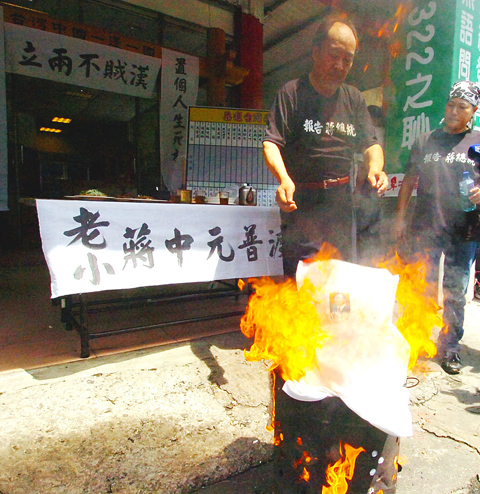Chinese Nationalist Party (KMT) Chairman Wu Poh-hsiung (吳伯雄) yesterday reiterated the party’s determination to fight corruption and urged party members not to gloat over the money-laundering allegations against former president Chen Shui-bian (陳水扁).
Speaking at a KMT Central Standing Committee meeting, Wu asked the central policy committee and party caucus to push for a law on unclear sources of property and seek an amendment to the Statute for the Punishment of Corruption (貪污治罪條例) in the next legislative session, which starts next month.
“We will not take pleasure in Chen Shui-bian’s case. Instead, we, and all politicians, should learn the lesson from the incident that no one can hide the truth forever,” Wu said yesterday at KMT headquarters.

PHOTO: HUANG CHI-YUAN, TAIPEI TIMES
Director of the KMT’s policy committee Lin Yi-shih (林益世) will communicate with the Ministry of Justice and the Judicial Yuan on establishing the regulations, the committee decided.
KMT caucus secretary-general Chang Sho-wen (張碩文) said yesterday that the caucus would propose the regulations in the legislature as soon as the new session begins.
KMT Legislator John Wu (吳志揚), the son of Wu Poh-hsiung, initiated a similar proposal last spring, suggesting that any official who failed to explain how he or she managed to accumulate large amounts of wealth should face up to three years in prison and a fine of up to NT$10 million (US$318,000).
The bill went to a preliminary review by the Judiciary and Organic Laws and Statutes Committee on May 29, but did not clear the legislative floor before the legislature went into recess last month.
The KMT chairman also rebutted allegations that some KMT members felt that President Ma Ying-jeou’s (馬英九) administration had handled the case involving Chen too slowly. The party will spare no effort in assisting the government with investigating Chen’s case, Wu Poh-hsiung said, and will work for clean government.
“No matter how embarrassing or despicable the truth is, we need to face it with courage ... People will no longer trust the government if we fail to investigate this case thoroughly, and it will shake the nation to its roots,” Wu Poh-hsiung said.
Meanwhile, in related news, the Central Election Commission (CEC) yesterday said it formed a task force to probe the allegations that Chen laundered campaign funds. The task force will look into whether Chen violated any laws by not declaring campaign funds in full and whether the CEC had any authority to impose sanctions on him.
“We will find out which laws or clauses originally listed under the CEC’s jurisdiction may apply to Chen’s case and whether we can intervene as an independent government institution,” CEC secretary-general Teng Tien-yu (鄧天祐) said after a two-hour task force meeting.
Regulations on declaring campaign funds were listed under the Election and Recall Law of Public Servants (公職人員選舉罷免法) and the President and Vice President Election and Recall Law (總統副總統選舉罷免法) until last year. After the clauses moved to other legislation, the CEC lost jurisdiction over violations of the rules.
However, as the case involves acts that occurred before last year, the CEC believes it may still have jurisdiction.
“If the CEC cannot handle the case, we will provide assistance to parties such as the court,” Teng said.
Under the original clauses, “Chen may be fined between NT$500,000 and NT$2.5 million,” he said.

Beijing could eventually see a full amphibious invasion of Taiwan as the only "prudent" way to bring about unification, the US Department of Defense said in a newly released annual report to Congress. The Pentagon's "Annual Report to Congress: Military and Security Developments Involving the People's Republic of China 2025," was in many ways similar to last year’s report but reorganized the analysis of the options China has to take over Taiwan. Generally, according to the report, Chinese leaders view the People's Liberation Army's (PLA) capabilities for a Taiwan campaign as improving, but they remain uncertain about its readiness to successfully seize

Taiwan is getting a day off on Christmas for the first time in 25 years. The change comes after opposition parties passed a law earlier this year to add or restore five public holidays, including Constitution Day, which falls on today, Dec. 25. The day marks the 1947 adoption of the constitution of the Republic of China, as the government in Taipei is formally known. Back then the Chinese Nationalist Party (KMT) governed China from Nanjing. When the KMT, now an opposition party in Taiwan, passed the legislation on holidays, it said that they would help “commemorate the history of national development.” That

Taiwan has overtaken South Korea this year in per capita income for the first time in 23 years, IMF data showed. Per capita income is a nation’s GDP divided by the total population, used to compare average wealth levels across countries. Taiwan also beat Japan this year on per capita income, after surpassing it for the first time last year, US magazine Newsweek reported yesterday. Across Asia, Taiwan ranked fourth for per capita income at US$37,827 this year due to sustained economic growth, the report said. In the top three spots were Singapore, Macau and Hong Kong, it said. South

Snow fell on Yushan (Jade Mountain, 玉山) yesterday morning as a continental cold air mass sent temperatures below freezing on Taiwan’s tallest peak, the Central Weather Administration (CWA) said. Snowflakes were seen on Yushan’s north peak from 6:28am to 6:38am, but they did not fully cover the ground and no accumulation was recorded, the CWA said. As of 7:42am, the lowest temperature recorded across Taiwan was minus-5.5°C at Yushan’s Fengkou observatory and minus-4.7°C at the Yushan observatory, CWA data showed. On Hehuanshan (合歡山) in Nantou County, a low of 1.3°C was recorded at 6:39pm, when ice pellets fell at Songsyue Lodge (松雪樓), a